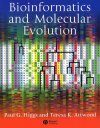![Bioinformatics and Molecular Evolution Bioinformatics and Molecular Evolution]()
Click to have a closer look
About this book
Contents
Customer reviews
Biography
Related titles
About this book
Provides comprehensive coverage of bioinformatics, including sequence analysis, biological databases, pattern recognition, and applications to genomics, microarrays and proteomics. Places bioinformatics in the context of evolutionary biology, giving detailed treatments of molecular evolution and molecular phylogenics and discussing evolution at the whole-genome level. Emphasizes the theoretical and statistical methods used in bioinformatics programs in an accessible way.
Contents
Chapter 1. Introduction
Chapter 2. Molecular Evolution
Chapter 3. Sequence Analysis Methods
Chapter 4. Phylogenetic Methods
Chapter 5. Information Resources for Genes and Proteins
Chapter 6. Pattern Matching
Chapter 7. Information Management & Databases
Chapter 8. Data Analysis Methods for Microarrays
Chapter 9. Computational Genomics
Appendix - Mathematical section
Glossary
Contents
Preface. Chapter Plan. Chapter 1. Introduction: The Revolution in Biological Information. Chapter 2. Nucleic Acids, Proteins, and Amino Acids. Chapter 3. Molecular Evolution and Population Genetics. Chapter 4. Models of Sequence Evolution. Chapter 5. Information Resources for Genes and Proteins. Chapter 6. Sequence Alignment Algorithms. Chapter 7. Searching Sequence Databases. Chapter 8. Phylogenetic Methods. Chapter 9. Patterns in Protein Families. Chapter 10. Probabilistic Methods and Machine Learning. Chapter 11. Further Topics in Molecular Evolution and Phylogenetics. Chapter 12. Genome Evolution. Chapter 13. DNA Microarrays and the 'omes. Mathematical Appendix. List of Web address. Glossary. Index.
Customer Reviews
Biography
Paul Higgs is currently the Canada Research Chair in Biophysics at McMaster University. Previously, he was the course director of the Bioinformatics MSc at Manchester University. He has a PhD in statistical physics from the University of Cambridge. His current research interests include RNA structure and sequence evolution, molecular phylogenetics, theoretical evolutionary biology, and population genetics. Teresa Attwood is Professor of Bioinformatics at Manchester University, Visiting Fellow at the European Bioinformatics Institute, and author of the PRINTS protein fingerprint database. She has a PhD in biophysics from the University of Leeds, and now teaches national and international courses in bioinformatics. Her current research interests include protein sequence analysis, data visualization, and biomedical text mining.
By: Paul G Higgs and Teresa K Attwood
365 pages, Figs
Bioinformatics meets evolutionary biology
Finally, it has arrived: The book I can confidently recommend to my students as the best in the field. That this single book has been able to cover so much is testimony to the dedication and quality of the authors. James McInerney, National University of Ireland "Much of bioinformatics is based on, yet too often ignores, the underlying principles of molecular evolution. This well-written book provides a description of modern bioinformatics methods while providing the biology and evolutionary theory necessary to understand how, why, and when these methods work. This is essential reading for those interested in being either a bioinformatics developer or an informed user." Richard Goldstein, National Institute for Medical Research "I like the text's balance; it is rigorous without being too formal, and has an accessible and broad coverage of topics from both a computer science and a biology perspective." Mohammad Zaki, Rensselaer Polytechnic Institute "This book nicely integrates molecular evolution and bioinformatics, two disciplines that go hand in hand, as rightfully claimed by the authors. Many bioinformatics applications are based on principles of molecular evolution, and to study molecular evolution is unthinkable nowadays without having access to the necessary tools and implementations. This is an excellent book for both undergraduate and graduate students, as well as for anyone who wants to solve problems in molecular evolution and needs to know the practicalities." Yves Van de Peer, Ghent University, Belgium "This book is actually fun! Fun, very educative, well organised, practical and easy to use...I wish this book had been published long ago." The British Toxicology Society Newsletter, November 2005 "...an excellent and current introduction to classical bioinformatics and an ideal core text for a Master's course in the subject." Comparative and Functional Genomics, November 2005



































